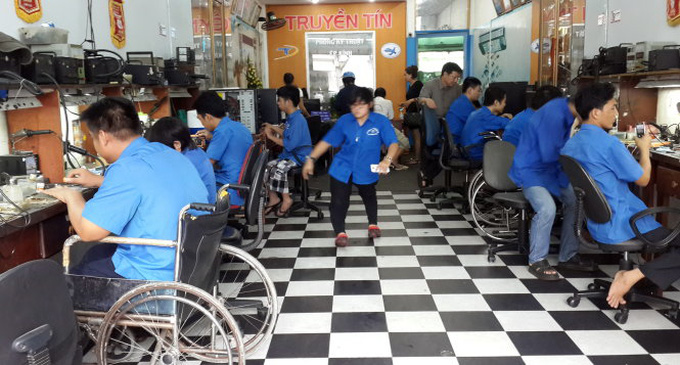From folks riding tricycle motorbikes to lottery ticket sellers with no hands, I’ve seen a lot of disabled people just within a block from my house. It’s so common an occurrence that it seems almost normal to me nowadays.
April 18th, 2019 marks the Vietnam Day of people with Disabilities. The idea is simple enough, to acknowledge and promote the contributions of disabled people to the nation; to dispel the idea that they are useless, unteachable and can’t add significantly to society.
The scale of the issue of disabilities in Vietnam is enormous. In this article I’m including the term ‘handicapped’ and related mental issues often occurring to victims. The United Nations did a national survey in 2016, finding that “over 7 per cent of the population aged 2 years and older, – around 6.2 million, have a disability but an additional 13 per cent – nearly 12 million, live in a household with a person with a disability.”
The Association for the Support of Vietnamese Handicapped and Orphans, which supports many promotion activities on the day to highlight the issues affecting people with disabilities such as access to better health and educational support, employment, stigma and discrimination in society and lots of other concerns, counts around 9.8 million handicapped people and orphans it has supported.
Also, disabilities impact a great number of poorer families who have difficulties getting support, paying for that, having facilities near enough to access, let alone the problem of simply finding out where help is available. Lack of education as well as full documentation (to access hospitals, for example) compounds these problems.
Having a disability is also not so well identified. Deafness for example is sometimes considered an ‘invisible’ condition, you’re not aware of it until you have to communicate with someone. The same goes for many, particularly children, with learning difficulties. For quite a few Vietnamese families, there’s someone with a chronic problem at home, thus becoming very more hidden from life. Raising awareness of these frequently under-reported impairments does help draw help and assistance, and of course – money, for medical and educational programs.
Some ailments are well known in Vietnam. Agent Orange still works its horrifying damage on generations long after war has ended. Yet workplace and traffic accidents create tens of thousands of injuries that are life-changing, relegate many to poverty, and are being shunned by mainstream society. Birth defects from living in unhealthy and polluted environments also add to the misery.
Probably the hardest part for Vietnam is too many victims, not enough help available. Even in urban areas the number of professional centers is nowhere near enough for the population of those areas – and it gets worse in such remote regions as the highlands. So it falls to the hundreds of non-government organizations and private citizens to do what they can.
I do admire the courage and stamina of the locals and foreigners running all sorts of programs such as free classes for the mentally handicapped, building wheelchairs for free, funding medical intervention and training for local staff and parents of patients with disabilities. However only the government can economically support many services, currently independently run that might be better integrated into state and province medical systems. I doubt this will be resolved any day soon. As it is much a question of money, some issues will lag behind until the nation’s economy grows bigger.
Two huge issues could still be addressed early enough. The number of people trained in assisting in disability therapy and organization and the lack of awareness, particularly amongst the poor, that there are ways to improve the lives of disability sufferers (and their families), not only for the affliction but for the future; employment, mobility, a sense of hope, confidence in themselves and ways they can contribute to society.
I’m not talking about more doctors and nurses although that’s never a bad thing! We need social workers with specialized training, such as teachers who know sign language, therapists who can work with children with mobility problems and mental impairments at the same time, case workers with strong social communication skills that can go into remote areas to persuade families to seek help, social advocates for those who can’t speak for themselves, and enlightened government officials who recognize the value of providing medical and educational help.
Perhaps one way would be to provide broader training in some of the areas I listed above at schools so graduates have a wider range of job opportunities in their chosen fields of medicine, teaching and social work. It’s a hope, but I’m an optimist by nature.
I’m half blind in one eye, my right ear is deaf and I’m about fifty percent deaf in my other ear. Through education and a lot of support when I was young, I’m still going strong these days. I became a teacher myself.
So if we think differently, alternatively about solutions and ideas about disabilities…we’ll give people abilities.




















































